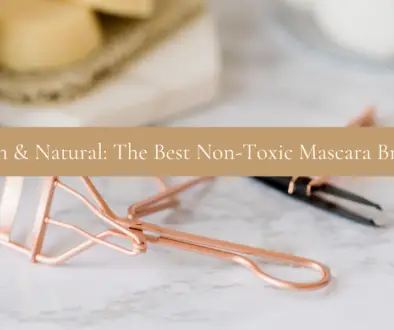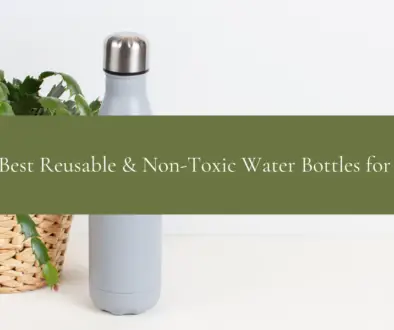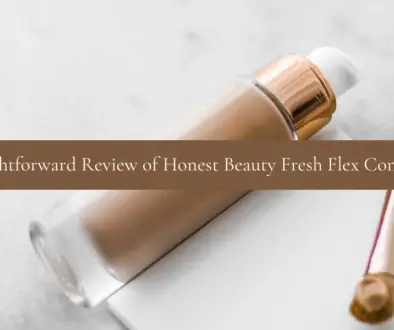Are Hello Bello Diapers Non-Toxic? An Honest Review
Are you expecting a new baby in your household? First, congratulations! What an exciting time for your family. If you’re trying to research non-toxic alternatives and are working on baby supplies, this post will help show you what diaper brands are safest. Additionally, you learn how to choose the best brand of diapers for your little one and answer the question: Are Hello Bello Diapers non-toxic?
Disposable diapers are a cornerstone of parenting, offering convenience and ease for busy families over alternatives like cloth diapers. However, concerns about conventional diapers’ safety and environmental impact have prompted many parents to seek non-toxic alternatives. Actors Kristen Bell and Dax Shepard co-founded Hello Bello, and the brand has garnered attention for its commitment to providing safe, eco-friendly diapers. In today’s review, we’ll look at the ingredients list of the most popular non-toxic diapers and compare them across the board. Factors like fragrance, potentially harmful chemicals to watch out for, and how to choose the best non-toxic disposable diaper for your sweet pea.
Non-toxic diapers aim to eliminate harmful chemicals and materials that pose health risks. Ingredients commonly present in conventional diapers, including chlorine, fragrance, phthalates, and dyes, are associated with skin irritation, respiratory problems, and hormone disruption. By opting for non-toxic diapers, parents can minimize their baby’s exposure to these potentially harmful substances. They’ll also provide a safer, more comfortable diapering experience.

What is considered ‘non-toxic,’ and are Hello Bello Diapers non-toxic?
When researching trustworthy brands, I look for products that meet several criteria before I feel comfortable purchasing them. Personal care items, in particular, often contain toxic chemicals such as synthetic fragrances, PFAs, parabens, phthalates, and heavy metals. I prefer fragrances sourced from natural ingredients like essential oils and organic materials whenever feasible to ensure safety.
Many conventional diapers contain synthetic materials and volatile organic compounds that make the manufacturing process more affordable. However, these toxic ingredients can cause an allergic reaction, diaper rash, and other serious health issues for our little ones. Non-toxic disposable diapers aim to eliminate harmful chemicals and materials that could irritate a baby’s sensitive skin or pose health risks. Using the safest option available when purchasing baby products is crucial, as babies are much more likely to absorb toxins than adults.
Chemicals commonly found in diapers and their potential risk
A lot of diapers contain the ingredients listed below. This list is not exhaustive, but these are some of the most concerning chemicals found in diapers and the potential health risks they pose.
chlorine dioxide
Often used in diapers to increase the absorbency of the fluff pulp, chlorine dioxide creates traces of known toxic chemicals called dioxins that increase the risk of developing rashes and cancer in children. To avoid exposure to such toxic ingredients, consider using TCF diapers, which stand for ‘totally chlorine free.’
VOCs
During manufacturing, VOCs are frequently emitted, and while diapers may contain only trace amounts, they are harmful to humans and associated with various health issues, including damage to the liver, kidneys, and central nervous system.
Fragrances
Synthetic fragrances may seem appealing when used to help mask odors, but their endocrine-disrupting chemicals aren’t worth the risk. The term ‘fragrance’ is a blanket statement in products that describe over 4,000 different chemicals instead of disclosing the exact ingredient. Organic baby diapers will contain safe ingredients and fragrances deemed safe for young babies.
Phthalates
Commonly added to plastic products to increase the flexibility of the plastic, but at what cost? Several studies have detected phthalates in diapers and found that they potentially affect the normal functions of the hormonal system and cause reproductive abnormalities.
Dyes
While colors and cute prints on diapers may seem fun and appealing, they often contain concerning ingredients. Many dyes cause allergic reactions and contact dermatitis.
Wetness Indicator
I love the convenience of the wetness indicator. It makes diaper changes so much easier, but this extra feature is not worth the added risk. Most wetness indicators include dye or a pH indicator. The color changes when urine contacts the dye or pH strip, indicating it’s time for a diaper change. Many of the ingredients found in wetness indicators consist of harmful chemicals, such as squats and halogenated organic compounds. These harsh ingredients are associated with various health concerns, including reproductive and developmental issues, as well as respiratory problems like asthma.
About Hello Bello products
Hello Bello diapers boast hypoallergenic, dermatologist-tested formulations and are free from chlorine, fragrances, latex, phthalates, and lotions. These facts would help make them appealing to parents concerned about chemical exposure. However, some of their ‘eco-friendly’ claims are somewhat questionable upon further research. The core consists of plant-based materials and sustainably harvested fluff pulp and SAP (super-absorbent polymer), but they hold no certifications proving such claims. They also do not offer organic diapers. So, are Hello Bello Diapers non-toxic? With this information in mind, I’m not convinced.

Performance review
I decided to test these diapers with our youngest before providing a review, and to be honest, I found them to be incredibly underwhelming. Maybe my little guy is just too chunky, but even sizing up didn’t fix the issues we had with leaking. There’s no way I could use these diapers overnight with any hope that his sheets would dry by morning.
The prints are adorable, and the diapers are relatively affordable, but if I have to change my son more often, are they truly at a lower price than other non-toxic brands? Probably not. Because of their questionable claims and less-than-stellar performance, I won’t be buying these diapers again.
Other ‘non-toxic’ diaper brands
Honest co. diapers
If you’ve read any of my other review posts, like my review of non-toxic sunscreen brands or non-comedogenic makeup brands, you might remember that I frequently promote Honest Company products. I am not an affiliate with Honest brand, but man, would that be awesome! I truly just love their products. While not every product in their lineup is perfect, many are EWG Verified or given a rating of 1 on the Skin Deep Database. I love how open they are with their ingredients and their ‘NO list’ containing over 3,500 ingredients they will never use.
While EWG has not reviewed their diapers, they carry an OEKO-TEX Standard 100 certification and use 100% sustainably sourced fluff pulp. In addition to carrying an incredible certification, Honest diapers are relatively affordable. For comparison, a 58-count size 4 pack of Huggies is currently $24.99 on Amazon, whereas a 54-count pack of size 4 Honest brand diapers is currently $29.99 on Amazon. Yes, they are a bit more expensive, but when you consider the difference in ingredients, the prices are very close.
Seventh Generation
From everything I’ve researched about Seventh Generation products, they seem like a brand trying to greenwash their product line. It’s frustrating that brands use these tactics to convince consumers that their products are safe when, in reality, they contain just as many questionable ingredients as their mainstream counterparts. The EWG has reviewed about 60% of the products offered by Seventh Generation, and over half of those products have a poor rating.
While their plant-based diapers contain chlorine-free wood pulp, the pros pretty much stop there. Toxins like polyurethane and polyethylene are 2 of many concerning ingredients.
Because of these questionable tactics, Seventh Generation diapers should not be considered non-toxic.
Millie Moon
Everything I’ve read about Millie Moon has been promising. Their diapers don’t contain any harsh chemicals or perfumes, and the brand carries an OEKO-TEX Standard 100 certification. If you’re unfamiliar with this certification, it means that every component of the diapers has been tested for harmful substances and is guaranteed to be safe for humans. I don’t know that you could ask for much more in disposable diapers! One of the only cons I’ve come across is their quiet switch from a Total Chlorine Free (TCF) bleaching process to an Elemental Chlorine Free (ECF) Process, which has potential hazards. Aside from this change, between the excellent reviews and certifications, Millie Moon Diapers is a great choice.
Additionally, if you head to their website, they’ll send you a free sample and cover the shipping!
Pampers Pure
While ‘cleaner’ than traditional Pampers diapers, I still would not add this brand to the list of natural diapers. Pampers Pure diapers are fragrance-free, contain no parabens, and use chlorine-free fluff pulp, but there is no mention of PFAs, phthalates, or VOCs. This leads me to believe that it is highly probable that some of these toxic ingredients have made their way into the diapers during manufacturing. I’d love to see them switch to organic cotton, as conventional cotton is heavily sprayed with pesticides.
EWG Verified Diapers
There is currently only one brand verified by EWG, and if you assumed that it’s not Hello Bello, you’d be correct. The brands mentioned above are not EWG verified, but Honest Co. and Millie Moon are great options for cleaner diapers. The only eco-friendly disposable diaper with an EWG Verified seal is Healthybaby Diapers. While they carry an OEKO-TEX Standard 100 certification and contain absolutely no harsh chemicals or synthetic fragrances, these pros come at a steep price. For a pack of 180 size 4 diapers, you’ll pay a whopping $130. That’s $0.72 per diaper. For comparison, the Honest Co. Diapers mentioned above are rated the highest among the brands I shared, and a pack of 104 size 4 diapers is currently $47.49 on Amazon. That’s around $0.44 per diaper.
I don’t doubt that Healthybaby diapers are excellent, but I couldn’t afford the price. As much as I want to find the best eco-friendly diapers, we must also consider our budget and stay within our means.

My honest review of Hello Bello Diapers
I have never understood the hype of celebrity-owned brands. I don’t care if the products I’m purchasing are from a brand a celebrity created or a brand someone in my town created. What matters most to me is ingredients and affordability. If a product doesn’t work the way a company claims, you better believe I won’t be wasting my money with that brand again. Additionally, the fact that Hello Bello doesn’t carry any certifications regarding the ‘natural materials’ they claim to use and the fact that my son leaked through a diaper so quickly, I will not purchase from them again. I need to stretch my budget as far as possible, and if a product doesn’t live up to its claims, I’ll find a better choice.
I set out to answer the question, ‘Are Hello Bello Diapers Non-Toxic?’ and I think I can answer that now. After all the research I’ve done on non-toxic diapers, I can confidently say that, no, Hello Bello diapers are not non-toxic. I don’t like how little they disclose about ingredients, their lack of quality, or their questionable claims.
Choosing non-toxic diapers is important when providing your baby with the safest and healthiest environment. By opting for diapers made from natural, biodegradable materials and free from harmful chemicals, parents can reduce their baby’s exposure to toxins and minimize their environmental impact. Unfortunately, Hello Bello doesn’t fit these criteria, but I’ve shared a few safe and affordable brands that do!
Have you tried any of the brands shared today? Let me know in the comments what your favorite brand is for your little ones.
This site may contain links to affiliate websites including Amazon. I may receive an affiliate commission for any purchases made by you through Amazon or other potential affiliates and no additional cost to you. Thank you for your support.






